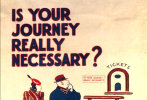I'm not a frequent flier, typically about 40 per year. This year has been a bit slower, up to 20 at the beginning of June. I've also taken three Red Eurostar and one white Eurostar trips this year - three for business, one for leisure.
For much of my work travel, the train is not feasible - I'm going to East Africa in a couple of days, which is not feasible by train and it's not feasible to do the work remotely.
Some institutions in my field put bars on staff using planes when the train alternative was below some number of hours that I've forgotten. However, I spoke to a colleague who did that to go to Copenhagen and the journey ended up taking a day and a half due to strikes and engineering works. They will not be doing that again.
Neither my partner or I live in our country of origin, so VFR is 10-12 flights a year. Both journeys we would need to make are technically feasible within a day. We've done the journey to the UK by train, which is quite OK, but often four or five times more expensive than flights, including all getting to airport/station costs. The leg within the UK is also too unreliable for comfort.
The journey south to my partner's country is an entire day, with an unappealing number of changes. The journey is such that if you miss one of those connections, you are done for the day. You'll need to spend a night. It's very difficult to get the journey priced up properly, and difficult to understand the consumer protection rules in place in the event of disruption etc.
For within Europe travel, some routes are a no-brainer by train - our recent work and leisure trips to Paris are testament to that. But it's limited to a number of core, usually capitals, city pair. But even then, the train company fell short. Our Red Thalys ended up starting short at Brussels, which wasn't communicated to us (we only noticed on the board) and nobody knew at all what to do. A poor showing.
But for further afield, ticketing needs to be improved, including cross-border/operator ticketing, consumer protection needs improving, information needs improving and journey modification in the event of IRROPs needs improving. The final issue is security, especially on overnight or late-arrivals. Some stations are really unappealing or uninviting places to spend time, especially after dark. Some cities, like Milan, have made efforts to make the station a better place. Very visible staff presence, and the Mercato offering excellent food options quickly. That being said, the area immediately outside the station leaves a huge amount to be desired.

